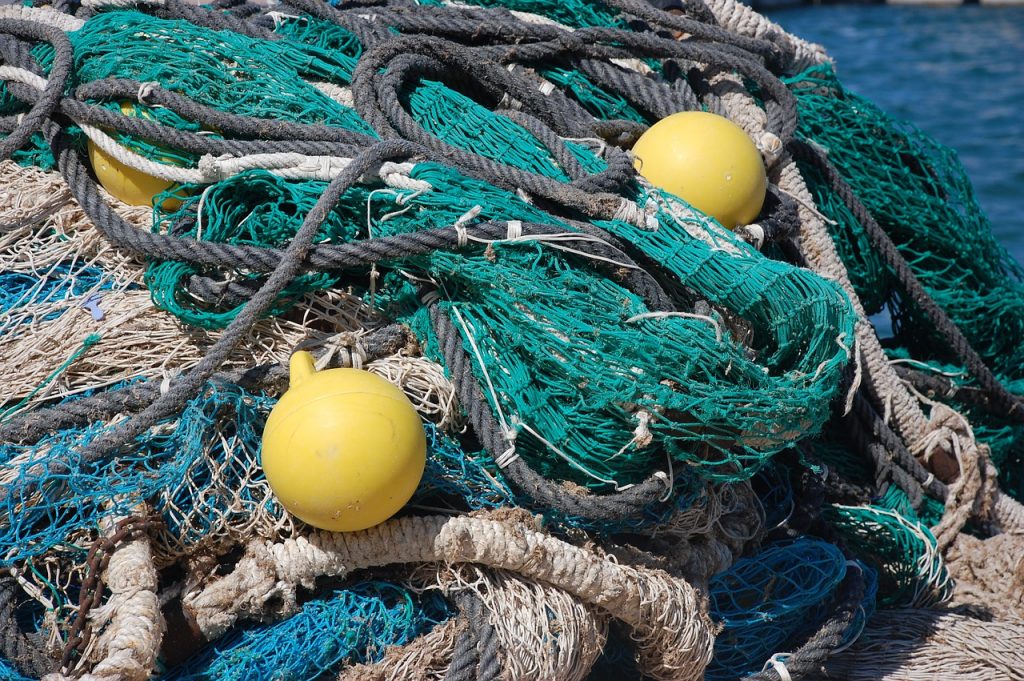The issue of marine litter, all of that plastic in our seas, has never been more prominent in the public consciousness. So it’s good to know both domestic and commercial carpet industries are beginning to play their own small part in helping to address the problem.
At May’s annual carpet buyers fayre in Solihull, Avonvale Carpets was glad to see a number of brand new products made from Econyl®, a regenerated nylon fibre made from synthetic waste that features a high proportion of abandoned fishing nets.
It performs just as well as new nylon, but can also be recycled and recreated time and time again.
‘Ghost fishing’
It’s been estimated that there’s around 640,000 tonnes of lost or discarded fishing gear in our oceans, and it’s simply killing our already struggling marine life through what’s been called ‘ghost fishing’.
It’s what happens when all the abandoned fishing nets, lines and traps continue to catch fish, dolphins, sharks, turtles, whales and other species. The marine life gets entangled in the netting, which attracts more marine life which also get trapped, and sadly so it continues.
Nobody gains from ghost fishing, the countless millions of deaths in marine life it causes are tragic and pointless.
Econyl®
Made predominantly from waste fishing nets recovered from the sea by the international Healthy Seas initiative, from waste industrial plastics, fabrics and even old carpets, Econyl has actually been manufactured by the Italian company, Aquafil since 2011.
The waste material is first cleaned and shredded, before being depolymerised to extract the nylon. Then it’s polymerised and transformed into a new nylon yarn that’s used to make a variety of sustainable textile-based products, most notably clothing and now carpets.
How Econyl helps
But not only does the manufacture of Econyl help to remove the abandoned fishing nets from our oceans and so save marine life, it’s also much kinder on the environment than virgin nylon manufacture.
Traditional non-biodegradable nylon yarn production requires a large amount of fossil fuel based raw material and a lot of water. The Econyl regeneration system uses less water, generates less waste and helps conserve our fossil fuels.
Considered in numbers, it is reported that per tonne, Econyl saves 7 barrels of crude oil and 5.7 tonnes of C02 equivalent emissions.
For businesses
Econyl has actually been used by contract carpet manufacturers for a number of years already, and our manufacturing partner Abingdon is the latest respected flooring brand to introduce a product made from Econyl regenerated nylon.
Made in Britain, the company’s hard-wearing ‘Infinite’ 500mmx 500mm carpet tiles suit a wide range of commercial uses including busy shops and offices.
Loop pile tufted and 100% Aquafil Econyl solution dyed nylon, Infinite tiles are available in a wide selection of colours, from the gently subdued to the very bright, to meet the needs of all kinds of interior design schemes.
An optional 100% recycled comfort backing is also available for the product, designed to provide the contract market with an effective sound proofing solution that significantly reduces impact noise on concrete floors.
For the home
And another of our manufacturing partners, Associated Weavers, has just become the first domestic carpet manufacturer to introduce an Aquafil Econyl fibre based product.
With the strapline, ‘Super soft carpet saving sea life’, its Sedna® collection is soft, luxurious and durable, with initial Varuna and Yara ranges offering a choice of 30 different colours for the home.
What’s more, all carpets in the Sedna collection come with an ECO FusionBac textile backing that’s made from 100% recycled PET plastic bottles.
We know it’s just the beginning, but we’re sure we’ll see a lot more carpet manufacturers in the future turning to Econyl, and other recycled products, to help look after our blue planet.
If you’d like to see some samples of Econyl carpets, for residential or business use, please just pop into the shop. We’ll be glad to help.

